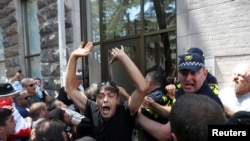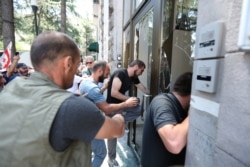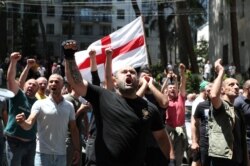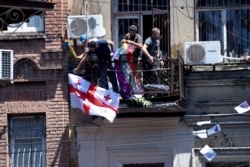More than 50 journalists were beaten and some were hospitalized Monday while covering a protest against a gay rights rally in Georgia's capital, Tbilisi.
Protesters, who gathered in opposition at the Tbilisi March for Dignity, blocked off a main street in the city and accused media of being propagandists for the LGBTQI movement.
Passersby and tourists were caught up in the violence, and one was stabbed. The Polish foreign ministry confirmed that a tourist from Poland was being treated in the hospital after a knife attack. A suspect has been arrested.
Several buildings, including the Tbilisi Pride offices and buildings belonging to the opposition Girchi political party and a civil rights organization, also were damaged.
Tbilisi Pride, the organizers for the March for Dignity event, had earlier called off the rally, saying that authorities had failed to provide the necessary security, the Associated Press reported.
"The inaction of the government has put the health and lives of Georgian citizens in real danger," the civic rights organization said in a Facebook statement.
Prime Minister Irakli Garibashvili had said earlier Monday that the Tbilisi Pride event could lead to a confrontation and the event was viewed as "unacceptable for a large segment" of the country's population.
Georgia is a predominantly conservative country.
Garibashvili said the Interior Ministry had communicated the risks to the event organizers and suggested alternative locations, according to local reports.
The prime minister condemned the violence Tuesday and said attacks on media were "categorically unacceptable." Garibashvili added that police are working to identify the attackers and bring them to justice.
Media under attack
The Vienna-based International Press Institute (IPI) said Monday that at least 42 journalists were injured during the violence, including at least eight who were hospitalized. By Tuesday, the number of attacks was estimated to be more than 50 by local media and the Interior Ministry.
Media rights group IPI says news crews were assaulted and kicked, struck by bottles and other projectiles, and had equipment damaged.
"The shocking scenes of violence against journalists covering anti-Pride protests in Tbilisi [Monday] are a horrific and direct attack on media freedom," IPI's deputy director Scott Griffen said in a statement.
Griffen said that media were singled out for attack, adding, "This is one of the most serious attacks on the press in Georgia in years and should be met with international condemnation."
At least two journalists needed surgery, including Alexander Lashkarava, a camera operator for the broadcaster TV Pirveli, who had broken bones in his face and damage to an eye; and Roma Tarughishvili, a video journalist for Palitra News, who had a broken nose and head injuries.
A camera operator for the public broadcaster Channel One had injuries to both eyes, and two journalists with Radio Free Europe/Radio Liberty were injured, including one who was left with a broken nose.
RFE/RL's president, Jamie Fly, condemned the violence and called for authorities to investigate.
"There is no justification for acts of violence against journalists who are simply doing their jobs, especially in a democracy," Fly said in a statement.
Separately, a large group of protesters assaulted Rati Tsverava, a journalist for TV Formula, near the parliament building after he tried to interview people at the protest.
Three Georgian channels have released a statement about the attacks on their staff. They blamed the prime minister for his comments earlier in the day Monday, which they said resulted in an "open hunting season for journalists," the IPI reported.
The European Union, United Nations, United States, and about 20 foreign embassies released a joint statement condemning the attacks on civil society, media, and the public.
"Participation in peaceful gatherings is a human right guaranteed by Georgia's Constitution. Violence is simply unacceptable and cannot be excused. Those who incite or threaten violence or commit violent acts are interfering with the efforts of Georgia's law enforcement professionals to uphold a safe and secure environment. They should be prosecuted to the full extent of the law," the joint statement read.
The statement called on Georgian leaders and law enforcement to protect journalists and publicly condemn the violence.
The Georgia Interior Ministry said Tuesday it has detained eight people and has spoken with 25 media representatives. Authorities said they are examining video footage of the violence.
Georgian President Salome Zurabishvili also has condemned the violence and visited some of the journalists who are receiving hospital treatment.
This story originated in VOA's Georgian service. Some information is from AP.







